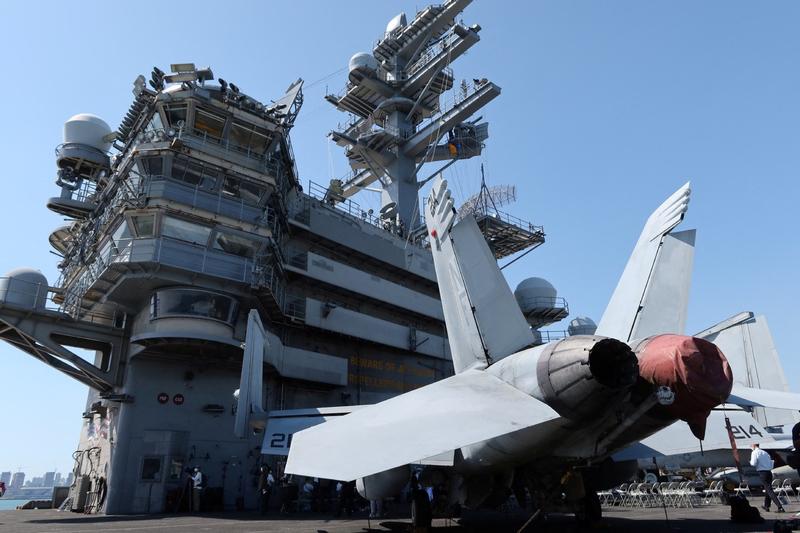 A US Navy F/A-18 jet sits on the deck of the USS Ronald Reagan as it is anchored at a port in Busan, South Korea, Sept 23, 2022. (PHOTO/AGENCIES)
A US Navy F/A-18 jet sits on the deck of the USS Ronald Reagan as it is anchored at a port in Busan, South Korea, Sept 23, 2022. (PHOTO/AGENCIES)
First sea exercise in years comes after other provocations directed at DPRK
The Republic of Korea and the United States on Monday began their first combined naval exercise near the Korean Peninsula in five years, a move that brings fears of escalating tensions on the peninsula and the risk for a crisis to flare up.
The four-day exercise on the Republic of Korea's east coast involves more than 20 vessels and an assortment of aircraft that will conduct drills on anti-ship and anti-submarine warfare operations, tactical maneuvers and other maritime operations, Seoul's navy said
The four-day exercise on the ROK's east coast involves more than 20 vessels and an assortment of aircraft that will conduct drills on anti-ship and anti-submarine warfare operations, tactical maneuvers and other maritime operations, Seoul's navy said.
The nuclear-powered USS Annapolis submarine was also taking part in the exercise, paving the way for the allies to conduct rare drills to detect and track the underwater warship.
ROK President Yoon Suk-yeol has vowed to beef up joint military exercises with the US, and he has adopted a harsher attitude toward Pyongyang that could complicate the situation in the region, observers fear.
ALSO READ: US aircraft carrier to visit ROK for combined drills
The allies claim that the training "will further improve capabilities for the Navies' combined operations and maintain a firm maritime defense posture based on the solid South Korea (ROK)-US alliance", said a senior ROK official who was quoted by Yonhap News Agency.
The drills came a day after the Democratic People's Republic of Korea conducted a short-range ballistic missile launch, the ROK's Joint Chiefs of Staff said on Sunday.
Li Nan, a researcher focusing on the Korean Peninsula at the Chinese Academy of Social Sciences, said the exercise demonstrates an increased hostility brought about by distrust between Washington and its ally Seoul and Pyongyang.
The muscle-flexing joint exercise is, according to the allies, a response to a recent move by Pyongyang related to its law on nuclear forces, which was, in turn, prompted by a large exercise between Seoul and Washington in late August and early September, as well as Yoon's "audacious" road map for the DPRK's denuclearization, Li said.
At the beginning of this month, the DPRK promulgated a law on the state policy on nuclear forces, according to the official Korean Central News Agency.
The law stipulates that the DPRK opposes all forms of war including nuclear warfare and aspires to build a peaceful world in which international justice is realized, it said.
READ MORE: ROK, US to launch preliminary drills ahead of major exercise
Like an endless loop with no exit, Pyongyang sees ROK-US joint drills as a provocation and threat, so it has to do something and vice versa, Washington and its ally have kept stirring up tensions on the pretext of boosting security, said Li, adding that there's no trail of trust left between the two sides.
Opposition voiced
The allies have long carried out joint exercises, which they insist are "defensive". The DPRK sees them as rehearsals for an invasion and has repeatedly expressed its strong opposition.
Last month, the US and the ROK staged their biggest combined military drills since 2018 — the resumption of large-scale training sessions that had been scaled back due to COVID-19 and the period of diplomacy with Pyongyang.
The naval exercise, Li said, also sent a message to the ROK and Japan, the US' key allies in the Asia-Pacific, that the US is doing what it claimed — extending the deterrence toward Pyongyang — in the recent joint statement reached at a vice-ministerial-level meeting of the Extended Deterrence Strategy and Consultation Group between the ROK and the US.
ALSO READ: ROK's general commands joint drills with US troops
When US President Joe Biden and Yoon met on the sidelines of the United Nations General Assembly in New York last week, the two leaders claimed that they are working together closely on the DPRK issue.
The drills, as well as other provocative moves of the two allies, have ratcheted up tensions on the peninsula in an ever-rising spiral, said Li, who also voiced concerns over likely crises lurking in the shadows.


